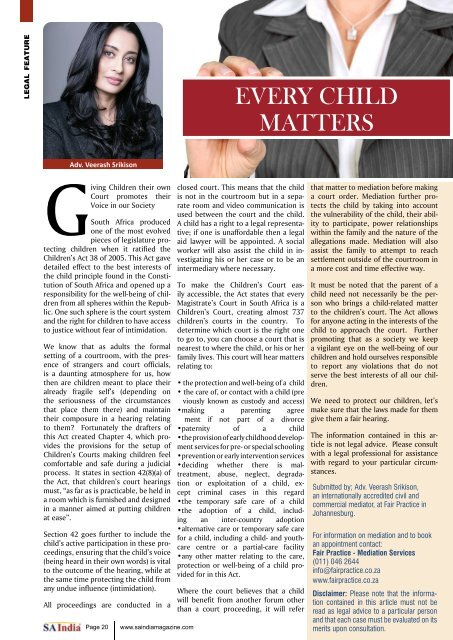SAINDIA MARCH 2017
The Premiere Indian News, Fashion, Lifestyle and Bollywood Magazine
The Premiere Indian News, Fashion, Lifestyle and Bollywood Magazine
You also want an ePaper? Increase the reach of your titles
YUMPU automatically turns print PDFs into web optimized ePapers that Google loves.
LEGAL FEATURE<br />
EVERY CHILD<br />
MATTERS<br />
Adv. Veerash Srikison<br />
Giving Children their own<br />
Court promotes their<br />
Voice in our Society<br />
South Africa produced<br />
one of the most evolved<br />
pieces of legislature protecting<br />
children when it ratified the<br />
Children’s Act 38 of 2005. This Act gave<br />
detailed effect to the best interests of<br />
the child principle found in the Constitution<br />
of South Africa and opened up a<br />
responsibility for the well-being of children<br />
from all spheres within the Republic.<br />
One such sphere is the court system<br />
and the right for children to have access<br />
to justice without fear of intimidation.<br />
We know that as adults the formal<br />
setting of a courtroom, with the presence<br />
of strangers and court officials,<br />
is a daunting atmosphere for us, how<br />
then are children meant to place their<br />
already fragile self’s (depending on<br />
the seriousness of the circumstances<br />
that place them there) and maintain<br />
their composure in a hearing relating<br />
to them? Fortunately the drafters of<br />
this Act created Chapter 4, which provides<br />
the provisions for the setup of<br />
Children’s Courts making children feel<br />
comfortable and safe during a judicial<br />
process. It states in section 42(8)(a) of<br />
the Act, that children’s court hearings<br />
must, “as far as is practicable, be held in<br />
a room which is furnished and designed<br />
in a manner aimed at putting children<br />
at ease”.<br />
Section 42 goes further to include the<br />
child’s active participation in these proceedings,<br />
ensuring that the child’s voice<br />
(being heard in their own words) is vital<br />
to the outcome of the hearing, while at<br />
the same time protecting the child from<br />
any undue influence (intimidation).<br />
All proceedings are conducted in a<br />
Page 20<br />
www.saindiamagazine.com<br />
closed court. This means that the child<br />
is not in the courtroom but in a separate<br />
room and video communication is<br />
used between the court and the child.<br />
A child has a right to a legal representative;<br />
if one is unaffordable then a legal<br />
aid lawyer will be appointed. A social<br />
worker will also assist the child in investigating<br />
his or her case or to be an<br />
intermediary where necessary.<br />
To make the Children’s Court easily<br />
accessible, the Act states that every<br />
Magistrate’s Court in South Africa is a<br />
Children’s Court, creating almost 737<br />
children’s courts in the country. To<br />
determine which court is the right one<br />
to go to, you can choose a court that is<br />
nearest to where the child, or his or her<br />
family lives. This court will hear matters<br />
relating to:<br />
• the protection and well-being of a child<br />
• the care of, or contact with a child (pre<br />
viously known as custody and access)<br />
•making a parenting agree<br />
ment if not part of a divorce<br />
•paternity of a child<br />
•the provision of early childhood development<br />
services for pre- or special schooling<br />
•prevention or early intervention services<br />
•deciding whether there is maltreatment,<br />
abuse, neglect, degradation<br />
or exploitation of a child, except<br />
criminal cases in this regard<br />
•the temporary safe care of a child<br />
•the adoption of a child, including<br />
an inter-country adoption<br />
•alternative care or temporary safe care<br />
for a child, including a child- and youthcare<br />
centre or a partial-care facility<br />
•any other matter relating to the care,<br />
protection or well-being of a child provided<br />
for in this Act.<br />
Where the court believes that a child<br />
will benefit from another forum other<br />
than a court proceeding, it will refer<br />
that matter to mediation before making<br />
a court order. Mediation further protects<br />
the child by taking into account<br />
the vulnerability of the child, their ability<br />
to participate, power relationships<br />
within the family and the nature of the<br />
allegations made. Mediation will also<br />
assist the family to attempt to reach<br />
settlement outside of the courtroom in<br />
a more cost and time effective way.<br />
It must be noted that the parent of a<br />
child need not necessarily be the person<br />
who brings a child-related matter<br />
to the children’s court. The Act allows<br />
for anyone acting in the interests of the<br />
child to approach the court. Further<br />
promoting that as a society we keep<br />
a vigilant eye on the well-being of our<br />
children and hold ourselves responsible<br />
to report any violations that do not<br />
serve the best interests of all our children.<br />
We need to protect our children, let’s<br />
make sure that the laws made for them<br />
give them a fair hearing.<br />
The information contained in this article<br />
is not legal advice. Please consult<br />
with a legal professional for assistance<br />
with regard to your particular circumstances.<br />
Submitted by; Adv. Veerash Srikison,<br />
an internationally accredited civil and<br />
commercial mediator, at Fair Practice in<br />
Johannesburg.<br />
For information on mediation and to book<br />
an appointment contact:<br />
Fair Practice - Mediation Services<br />
(011) 046 2644<br />
info@fairpractice.co.za<br />
www.fairpractice.co.za<br />
Disclaimer: Please note that the information<br />
contained in this article must not be<br />
read Bollywood as legal advice playback to singer a particular turns person judge<br />
and that each case must be evaluated on its<br />
merits upon consultation.

















